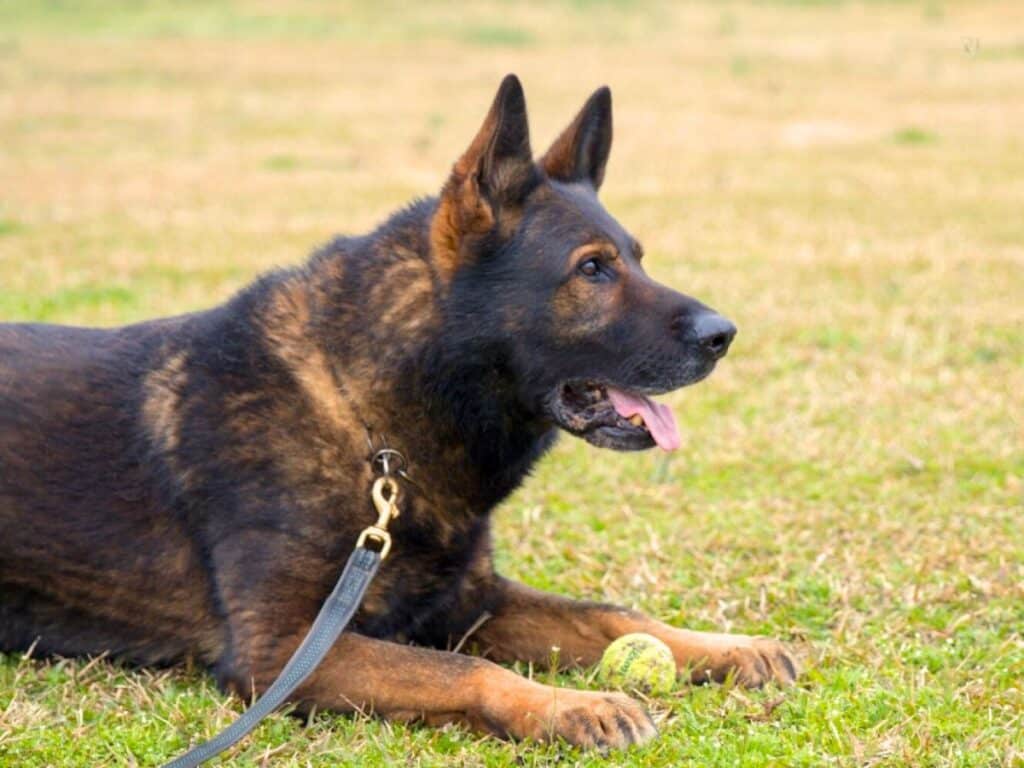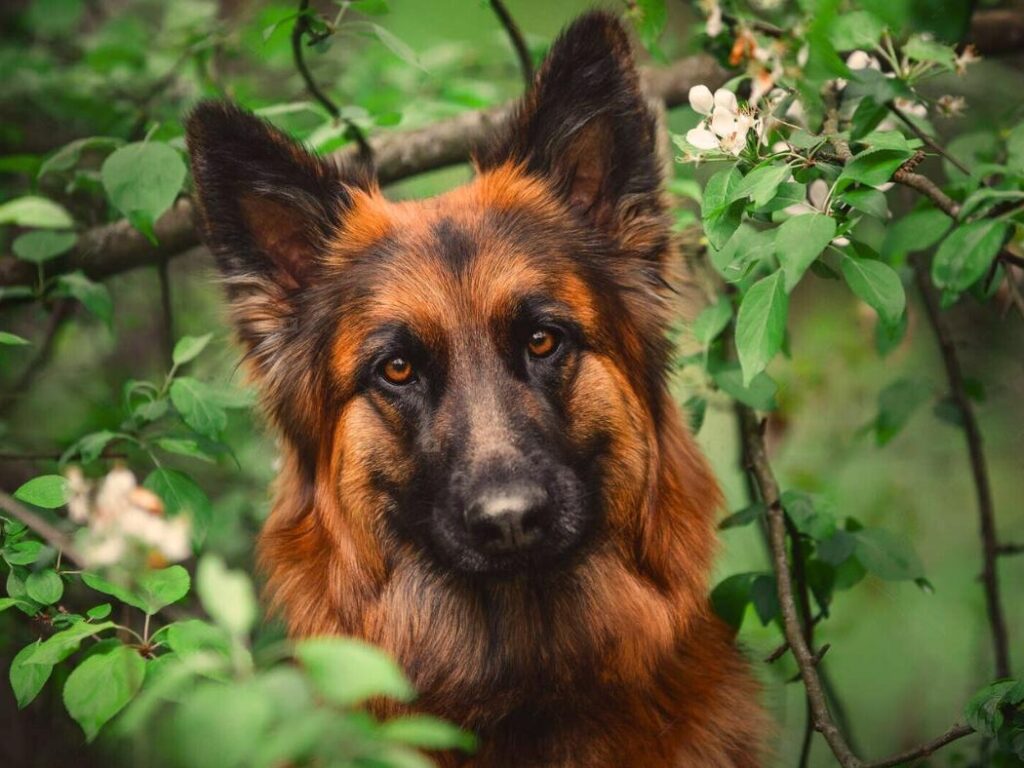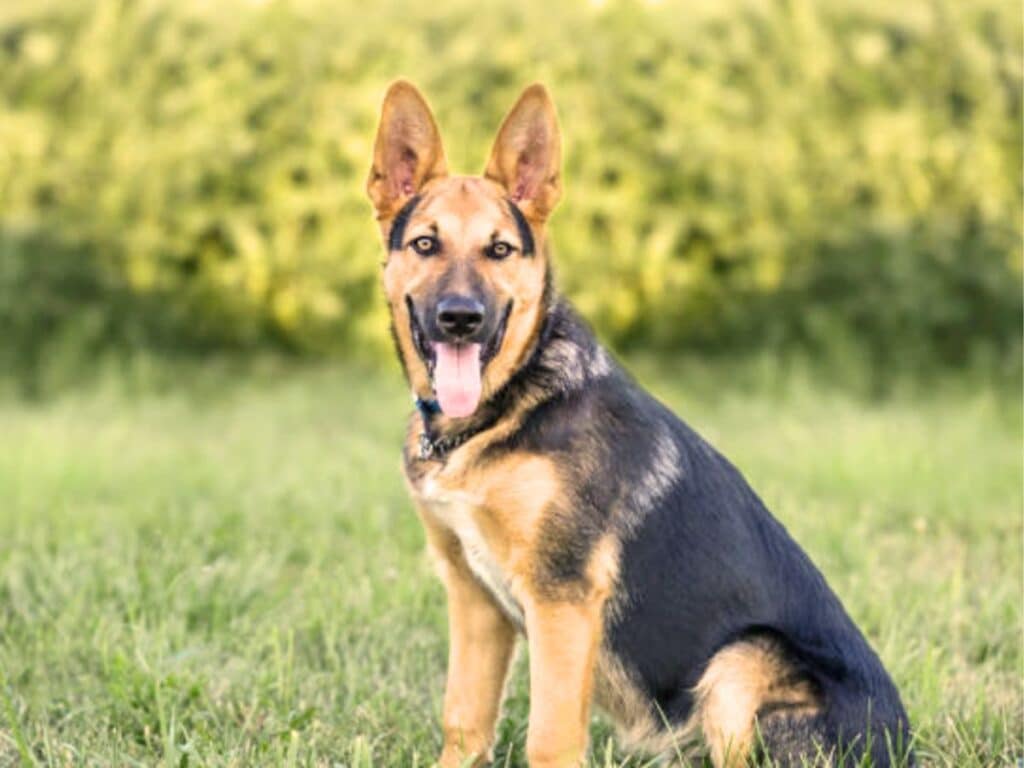So, you’ve got a 6-week-old German Shepherd puppy and you’re wondering where to start. You’re in the right place!
Raising a young pup is like nurturing a tiny tree – with the right care and attention, it’ll grow strong and healthy.
In this guide, we’ll cover everything from a six-week-old GSD puppy’s average weight, and feeding guidelines to their behavior and potty training, giving your pup the best start in life.
6 Week Old German Shepherd Puppy
At six weeks of age, a German Shepherd puppy is in the early stages of development, showcasing a delightful blend of curiosity and playful energy.
The table below provides a snapshot of key details regarding a 6-week-old German Shepherd, offering insights into their size, diet, health, and developmental milestones during this crucial early stage of their lives.
| Weight | Typically around 7-14 pounds |
| Height | 4 – 7 inches |
| Eyes | Blue or gray, may change as they grow |
| Ears | Will be floppy |
| Teeth | Will have almost all its baby teeth |
| Diet | Mostly on mother’s milk or puppy formula |
| Feeding Frequency | 4-5 times a day |
| Sleep | Sleeping a lot, around 18-20 hours per day |
| Physical Activity | Beginning to explore surroundings |
| Socialization | Bonding with littermates and mother, |
| Training | Basic commands like sit and come may be introduced |
| Healthcare | Puppies should start receiving first vaccinations at 6-8 weeks old |
| Behavior | Curious, playful, developing basic motor skills |
| Toileting | Still learning to control bladder and bowels |
| Grooming | Minimal grooming, possibly starting to shed puppy fur |
| Developmental Milestones | Eyes and ears starting to open fully, beginning to walk and play |
Please note that individual puppies may vary, and it’s important to consult with a veterinarian for specific care advice based on the puppy’s health and needs.
6 Week Old German Shepherd Weight
At 6 weeks of age, a German Shepherd puppy typically weighs around 7-14 pounds. However, individual variations may occur, and it’s important to monitor the puppy’s growth to ensure they are within a healthy weight range.
German Shepherds undergo rapid growth in the first few weeks of their lives. This rapid development is essential for survival as they transition from complete dependence on their mother to becoming more independent.
How Big is a 6 Week Old German Shepherd
At 6 weeks old, a German Shepherd puppy is still quite small compared to what it will be as an adult. On average, they may measure around 4 to 7 inches in height at the shoulder.
Keep in mind that individual puppies can vary in size, and the measurements are approximate.
This stage marks the early emergence of defining features like ear posture and coat color. Over the coming months, German Shepherd puppies will undergo significant growth, both in size and cognitive abilities.
As your puppy matures, its intelligence, loyalty, and innate protective instincts, characteristic of the breed, will gradually become more apparent.
To learn and understand more about your puppy’s growth stages & developmental milestones, please refer to my article German Shepherd Growth Stages.

What Does a 6 Week Old German Shepherd Look Like?
At 6 weeks old, a German Shepherd puppy is still quite young and will exhibit certain characteristics typical of puppies in their early stages of development.
- Size: German Shepherd puppies grow rapidly, but at 6 weeks, they are still relatively small compared to their adult size. They are generally fluffy and have a soft coat.
- Coat: At 6 weeks, their fur is usually short and soft, and the color pattern may be starting to become more distinct. However, the coat may still change as the puppy grows.
- Ears: German Shepherd puppies typically have floppy ears at this age. The ears will begin to stand erect as the puppy gets older, usually starting to stand up between 8 to 16 weeks of age.
- Eyes: Their eyes are usually open, bright, and alert. The color of the eyes can vary but is typically dark.
- Teeth: Puppies start to get their baby teeth around 3-6 weeks. By 6 weeks, they should have a set of sharp little teeth. They may still be nursing but will also be starting to eat solid puppy food.
- Movement: At 6 weeks, puppies are likely becoming more active and curious about their surroundings. They may be starting to explore and play with their littermates.
- Socialization: German Shepherd puppies are known for their intelligence and sociability. At 6 weeks, they should be interacting with their littermates and caretakers and starting to learn basic social behaviors.
Remember that individual puppies may vary, and the rate of development can depend on factors such as genetics, nutrition, and the environment in which they are raised.
Feeding Guidelines
How Much Should a 6 Week Old German Shepherd Eat?
A general guideline for feeding is to provide small, frequent meals throughout the day. Puppies at this age typically eat about 4 to 5 times a day. A common recommendation is to feed the mother’s milk or around 1/4 to 1/3 cup of puppy mush per meal.
At this age, most German Shepherd puppies are still nursing or receiving a puppy formula, and they may be gradually introduced to solid puppy food.
However, it’s essential to consult with your veterinarian for personalized advice based on your puppy’s requirements.
Additionally, they can guide you on the transition from a liquid diet to solid food, ensuring a smooth and healthy weaning process.
RELATED: How Much To Feed a German Shepherd Puppy

What to Feed 6 Week Old German Shepherd Puppies?
At 6 weeks old, German Shepherd puppies are typically transitioning from nursing to solid food. Here’s what you can feed your puppy:
- Puppy Formula: If the puppy is not fully weaned, they may still be receiving mother’s milk or a commercial puppy formula. Ensure that the formula is appropriate for their age and nutritional needs.
- High-Quality Puppy Food: Start introducing a high-quality puppy food that is specifically formulated for large breed puppies. Look for a product that lists meat as the main ingredient and is free from artificial additives.
- Softened Dry Kibble or Wet Food: Since a 6-week-old puppy may or may not have all their baby teeth yet, you can soften dry kibble with warm water or mix it with a quality wet puppy food to make it more palatable and easier to eat.
Feed your puppy small, frequent meals throughout the day to accommodate their smaller stomach capacity.
RELATED: What Do German Shepherds Eat?
How Much Water Should a 6 Week Old German Shepherd Have?
Typically, young German Shepherd puppies need around half a cup of water every two hours. It’s important to keep an eye on your puppy to ensure he’s drinking enough but not excessively.
For older puppies that have completed the weaning process, the recommended water intake generally falls between half an ounce and one ounce per pound of body weight daily.
For instance, if your pup weighs 20 pounds, the daily water requirement would range from 10 to 20 ounces. On especially active days, he may need even more water.
RELATED: How Much Water Do German Shepherds Drink in a Day?

How to Train a 6 Week Old German Shepherd Puppy
Training a young puppy involves focusing on basic behaviors and socialization. Keep in mind that very young puppies have short attention spans, so training sessions should be brief and positive. Here are some tips for training your pup:
Basic Commands:
- Name Recognition: Start by using the puppy’s name consistently. Say the name and reward the puppy when they respond by looking at you.
- Sit: Gently guide the puppy into a sitting position using treats as a reward.
- Come: Use the pup’s name and ask him to come to a specific place.
RELATED: 30 German Shepherd Training Commands & Free PDF
Positive Reinforcement:
Use positive reinforcement such as treats, praise, and affection to encourage good behavior. Reward the puppy immediately after they perform the desired action.
Socialization:
Introduce your puppy to various people, environments, and sounds to promote socialization. Ensure these experiences are positive and not overwhelming.
RELATED: How To Socialize Your German Shepherd Puppy: Checklist Included
Crate Training:
Introduce the puppy to a crate as a safe and comfortable space. Make it a positive experience by placing treats and toys inside.
RELATED: How to Crate Train a German Shepherd Puppy?
Handling and Grooming:
Get the puppy used to being handled, including touching their paws, ears, and mouth. This will make grooming and veterinary care easier in the future.
House Training:
Be consistent with taking the puppy outside for bathroom breaks. Praise and reward them when they eliminate outdoors.
RELATED: How To Potty Train a German Shepherd Puppy Easily
Establish a Routine:
Establish a daily routine for feeding, playtime, training, and rest. Consistency helps the puppy learn what to expect.
Positive Associations:
Associate new experiences with positive things. For example, reward the puppy for calm behavior during car rides.
Avoid Negative Reinforcement:
Avoid using punishment or negative reinforcement. Instead, focus on redirecting unwanted behavior and reinforcing positive alternatives.
Remember that patience is key, and training should always be gentle and positive. At 6 weeks old, German Shepherd puppies are still very young, and their abilities are limited. As they grow, you can gradually introduce more advanced training commands.

Check out this cute video of 6 week old German Shepherd puppies playing…
6 Week Old German Shepherd Puppy Care
Taking care of a puppy involves addressing their basic needs, ensuring proper nutrition, providing a safe environment, and promoting socialization and early training.
Here’s a guide on how to take care of your GSD puppy:
Nutrition:
- Feed a high-quality puppy food/mush suitable for large breeds. Ensure that it is nutritionally balanced and meets the specific needs of a growing German Shepherd.
- Puppies usually eat multiple small meals throughout the day. Follow the feeding guidelines provided by the breeder or veterinarian.
- Fresh and clean water should be available at all times.
Healthcare:
- Schedule a visit to the veterinarian for a health check-up, vaccinations, and deworming.
- Discuss a vaccination schedule and preventive care, such as flea and tick prevention.
RELATED: German Shepherd Vaccination Schedule: PDF Chart Included
Hygiene and Grooming:
- Gently introduce the puppy to grooming activities, such as brushing, nail trimming, and ear cleaning.
- Begin dental care by introducing a puppy-safe toothbrush or dental chews.
Socialization:
- Expose the puppy to various environments, people, and other animals to promote positive socialization.
- Encourage positive interactions and playtime with family members.
Training:
- Start basic training commands such as “sit,” “stay,” and recall. Keep training sessions short and positive.
- Use positive reinforcement techniques like treats and praise to encourage good behavior.
Crate Training:
- Introduce the puppy to a crate as a safe and comfortable space. Use positive reinforcement to create a positive association with the crate.

Safe Environment:
Puppy-proof your home by removing potential hazards and providing a safe space for exploration.
Supervise outdoor activities to prevent the puppy from ingesting harmful substances.
RELATED: How to Prepare Your Home For a German Shepherd Puppy
Exercise:
- While strenuous exercise should be limited due to the puppy’s young age, provide short play sessions to expend energy.
- Allow for supervised exploration in a secure and controlled environment.
RELATED: How Much Exercise Does a German Shepherd Need? (Chart Included)
Gentle Play:
- When engaging in playtime with your pup, make sure that all interactions are gentle and positive.
- Use toys designed specifically for puppies’ teeth rather than hands or feet; this will discourage biting humans as a form of play.
Rest & Sleep:
- Ensure the puppy gets adequate rest and sleep. Provide a comfortable bed or crate for naps.
Identification:
- Consider microchipping and ensuring the puppy wears a collar with an ID tag containing your contact information.
Veterinary Care:
- Schedule regular veterinary check-ups to monitor the puppy’s growth and address any health concerns.
Emotional Well-being:
- Spend quality time with the puppy, offering companionship and building a strong bond.
- Provide toys for mental stimulation and encourage independent play.
Remember, each puppy is unique, and individual needs may vary. Regular check-ins with your veterinarian and adapting care routines to your puppy’s specific requirements will contribute to their overall health and well-being.

Puppy’s Behavior
Here are some common behavioral traits and characteristics you might observe in a 6-week-old German Shepherd:
- Exploration: Puppies at this age are curious and begin to explore their surroundings. They use their senses to investigate objects, people, and other animals.
- Playfulness: Your puppy may engage in play with littermates, toys, or even with their human caretakers.
- Socialization: Puppies may start to show an interest in interacting with people and other animals. Positive interactions at this age contribute to their future behavior.
- Attention Span: Puppies at that age have short attention spans.
- Bite Inhibition: Puppies start to learn bite inhibition by interacting with littermates. If a puppy bites too hard during play, the other puppy will yelp, teaching the biting puppy to be gentler. You should continue to reinforce this lesson.
- Dependency: At 6 weeks, puppies are still dependent on their mother’s milk, but they may start to be introduced to solid food. They may also begin the process of weaning.
- Vocalization: Puppies may vocalize to communicate their needs, such as when they are hungry, tired, or seeking attention. Whining and barking are common forms of communication.
- Toilet Training: While not fully toilet trained, puppies at this age may start to show some understanding of bathroom habits. Consistent and patient toilet training is necessary.
It’s important to note that individual puppies may vary, and behavior can be influenced by factors such as genetics, early experiences, and the environment.
RELATED:

How Much Should a 6 Week Old German Shepherd Sleep?
At 6 weeks old, German Shepherd puppies tend to sleep a significant amount, often ranging from 18 to 20 hours per day. Puppies, in general, require a lot of sleep as it plays a crucial role in their growth and development.
The sleeping pattern of a puppy is influenced by their age, energy levels, and the demands of their growing bodies.
Here are some key points regarding the sleep patterns of a young puppy:
- Short Activity Periods: While awake, puppies at this age typically engage in short bursts of activity, exploring their surroundings, playing with littermates, and interacting with their human caregivers.
- Frequent Naps: After periods of activity, puppies often need to rest and may take frequent naps throughout the day.
- Nighttime Sleep: Puppies may sleep for longer stretches at night, but they may also wake up for bathroom breaks and to eat. It’s common for them to wake up several times during the night.
It’s important to note that as the puppy grows, their sleep patterns will gradually change. Older puppies will become more active and spend more time awake during the day.
You can refer to my article German Shepherd Sleep Habits From Puppyhood to Senior Yearsto learn more about your pup’s sleeping patterns as he/she matures.
Closing Thoughts
You’ve now got a solid grasp of how to care for your 6-week-old German Shepherd. From understanding their growth stages to providing essential care, feeding guidelines, and training fundamentals, you’re well-equipped to ensure your pup’s optimal health and happiness. Remember, consistency is key. Keep up with regular vet check-ups, maintain a balanced diet, and engage in plenty of playtime to foster a strong bond with your furry friend.
FURTHER READING:




